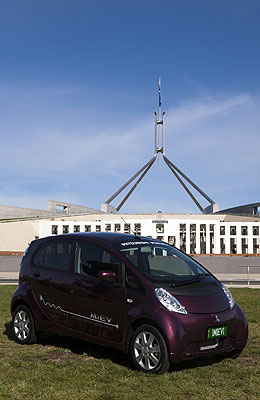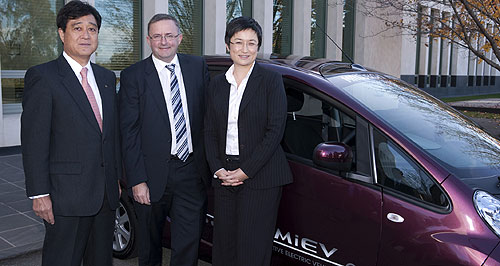New models - Mitsubishi - i-MiEVMitsubishi first to launch EV in AustraliaIn gear: Federal transport minister Anthony Albanese tests the Mitubishi i-MiEV while climate change minister Penny Wong (back seat) and Mitubishi's global president Osamu Masuko go along for the ride. First 40 i-MiEVs confirmed for release from July as Mitsubishi wins Aussie EV race2 Jun 2010 MITSUBISHI has accomplished its mission to be the first car-maker to release a mass-production electric vehicle (EV) in Australia. The company’s global chief today announced the first 40 Australian-specification examples of the Japanese brand’s ground-breaking i-MiEV city-car will arrive Down Under from next month. Mitsubishi Motors Corporation’s global president Osamu Masuko confirmed the i-MiEV shipment, which follows a national ‘road show’ of a single model last year and capital-city field trials of two Japanese-spec versions earlier this year, during a media conference in Sydney this evening. Mr Masuko, in his first official visit to Australia, made the announcement after meeting with the prime minister Kevin Rudd, federal minister for infrastructure and transport Anthony Albanese and federal climate change minister Penny Wong in Canberra earlier today. “As you know, i-MiEV has been attracting a lot of attention in Australia and I am pleased to announce that we can now confirm that an additional 40 units will be arriving here from July and August,” said Mr Masuko. “These vehicles will take part in further long-term trials with high-profile users and represent the first volume electric vehicles available on the Australian market. This announcement will ensure that we will be number one in bringing the electric vehicle to Australia.” The pioneering i-MiEV mini-car beats the Tesla Roadster sportscar, first examples of which are expected to go on sale here in August, as the first EV to be released in Australia, ahead of an expected influx of engineless new models over the next two years. The Australian importer of Great Wall and Chery vehicles has promised to release the first Chinese EV here next year, while larger five-door hatchbacks in the Nissan Leaf EV and Holden Volt plug-in hybrid are due on sale here in 2012, ahead of a host of hybrid or all-electric small cars from most mainstream car brands. However, strictly limited global supplies of the i-MiEV will mean it won’t be available to everyone – nor will Australians yet be able to own the i-MiEV. Instead, Mitsubishi Motors Australia Limited will lease the battery-powered four-seater compact to customers for $1740 a month over a three-year term – equating to a total price of $62,640 - after which the cars will return to Mitsubishi’s Australian distributor. As part of the next step of its EV rollout in Australia, Mitsubishi says it will establish a “foundation customer group” for the first i-MiEVs in Australia by selecting potential owners with the best ability to “co-promote” EVs in Australia. Vice-president of corporate strategy Paul Stevenson said MMAL will invite a range of interested parties to take part in the initial i-MiEV lease program this month.  Applications will close in late June, before the initial list of lessees – which is expected to include federal, state and local government departments, high-profile fleet customers, private individuals and perhaps even celebrities – is decided ahead of first deliveries in the first half of July. Applications will close in late June, before the initial list of lessees – which is expected to include federal, state and local government departments, high-profile fleet customers, private individuals and perhaps even celebrities – is decided ahead of first deliveries in the first half of July.“This is the important next step of our EV strategy,” said Mr Stevenson. “We should be over-subscribed, but it’s hard to say. Everyone wants one, but going to the next stage is different.” Mitsubishi has committed to making the i-MiEV freely available to Australians but will not say when subsequent shipments of i-MiEV vehicles will arrive here or how many they will include. The i-MiEV went on sale to fleet buyers in Japan in July 2009 and has now commenced retail sales in its domestic market. Mitsubishi sold 1400 examples in Japan ion its 2009 fiscal year, ending in March. MMC recently announced an increase in production and plans to build more than 40,000 vehicles by fiscal year 2012. By 2020, it says 20 per cent of its total new-vehicle sales will be either EVs or plug-in hybrids. For now, the company has said it will prioritise the allocation of global i-MiEV supplies based on which nations offer the greatest incentives to consumers. Australian governments do not currently offer the type of tax subsidies available in many areas of Europe and North America, where consumers are offered tax breaks of between $5000 and $8000 to switch to EVs. In Japan, the car sells for around $33,000 after government incentive, but without similar concessions the price of the i-MiEV would be about $60,000 here. As production volume increases, however, the cost of its lithium-ion battery packs – currently the most expensive and heaviest component of most EVs – will decrease. Mr Masuko, who posed with federal politicians for pictures of the i-MiEV in Canberra today, said he did not discuss the issue of incentives for ‘green’ vehicles with the Australian government, but indicated he would do so. “We will continue our discussions with state and federal governments regarding the policy changes and infrastructure that is required to support the full-scale launch of electric vehicles in the Australian market,” he said. “On this note, I have travelled to Canberra today where I met with the federal minister for infrastructure and transport Anthony Albanese, the minister for climate change Penny Wong and the prime minister, Kevin Rudd. “We had a very positive meeting and I look forward to our continuing discussions. “There are already incentives in Japan and Europe ... and we will require incentives from governments (in Australia). (But) in the long-term we cannot rely fully on government incentives,” he said. Mitsubishi has consistently said that EV barriers such as a lack of recharging infrastructure do not apply in Australia. “The i-MiEV is easier to slide into use here than overseas,” said Mr Stevenson. “Hurdles that exist in some countries that run on 110-volt power and where most people live in apartments do not exist here. Most of us have off-street parking and out 240-volt power grid mean the i-MiEV can be charged in our own garages in eight hours. “This is the first chance for customers to drive the car long-term and see what EVs are really like to live with in Australia,” said Mr Stevenson, who added that MMAL’s i-MiEV rental arrangement, which similar the lease deal announced recently by Nissan for the Leaf in Japan, was also designed to protect its customers. “These are production cars, but like all new technologies its price will come down. For now, our preferred option is to lease. Sales to the general public is the next step, but this will be a guide to the demand out there.” MMAL CEO and president Masahiko Takahashi said his company would not face a shortage of potential owners for the i-MiEV in Australia. “Over the last 12 months we have conducted feasibility trials with potential electric vehicle customers, such as local, state and federal government bodies, and major fleet operators, and the reaction has been overwhelmingly positive,” he said. The i-MiEV, which stands for Mitsubishi innovative Electric Vehicle, has also undergone feasibility studies in the United States, Europe, the United Kingdom, New Zealand, Iceland and Canada. As we reported after driving it in Brisbane in March, the 3.5-metre i-MiEV offers a seamless spread of instant torque from its 47kW/180Nm permanent magnet synchronous motor, which is powered by a Li-Ion battery in place of the standard i-car’s petrol engine. Critics point out that the production of EVs and their batteries is in many cases more carbon-intensive than conventional internal combustion-engined vehicles, and that in countries that rely mainly on coal-fired power stations – such as Australia – EVs simply shift CO2 emissions from exhaust outlets to smoke stacks. However, Mitsubishi says the i-MiEV’s electric motor is smaller, produces more torque at low revs and is quieter than a similarly-powered turbocharged petrol engine, and makes the i-MiEV one of the world’s first truly viable “zero drive-time emission” city commuters in volume production. While a number of locally converted EVs are already on sale in Australia, Mitsubishi says it is not disappointed Tesla will beat it to become the first brand to release a mass-production EV for sale to the Australian public. “We think it’s fantastic Tesla is coming,” said Mr Stevenson. “It will raise awareness of EVs in general, but they’re in a different market. It depends on your definition – in terms of a recognised manufacturer, we are still the first with an EV in Australia.”  Read more31st of March 2010  First drive: i-MiEV a mighty quiet achieverWe drive the first Mitsubishi i-MiEV production car to land Down UnderAll new models Alfa Romeo Alfa Romeo Abarth Abarth Audi Audi Aston Martin Aston Martin BMW BMW Bentley Bentley Chrysler Chrysler Chevrolet Chevrolet Dodge Dodge Citroen Citroen Ferrari Ferrari DS DS Ford Ford Fiat Fiat FPV FPV Foton Foton Haval Haval Great Wall Great Wall Honda Honda Holden Holden Hyundai Hyundai HSV HSV Isuzu Isuzu Infiniti Infiniti Jeep Jeep Jaguar Jaguar Lamborghini Lamborghini Kia Kia Lexus Lexus Land Rover Land Rover Mazda Mazda Maserati Maserati Mercedes-Benz Mercedes-Benz McLaren McLaren Mini Mini Nissan Nissan Mitsubishi Mitsubishi Peugeot Peugeot Opel Opel Proton Proton Porsche Porsche Renault Renault Ram Ram Saab Saab Rolls-Royce Rolls-Royce Smart Smart Skoda Skoda Subaru Subaru SsangYong SsangYong Tesla Tesla Suzuki Suzuki Toyota Toyota Volvo VolvoMotor industry news |
|
















Facebook Twitter Instagram